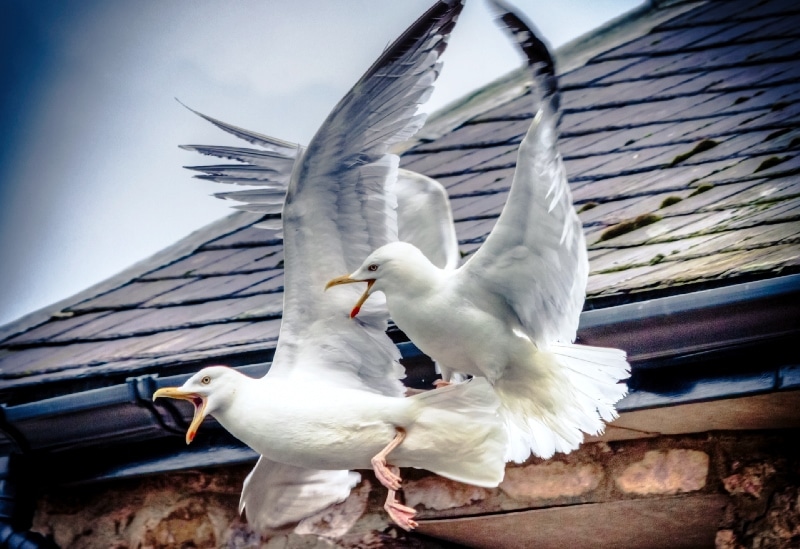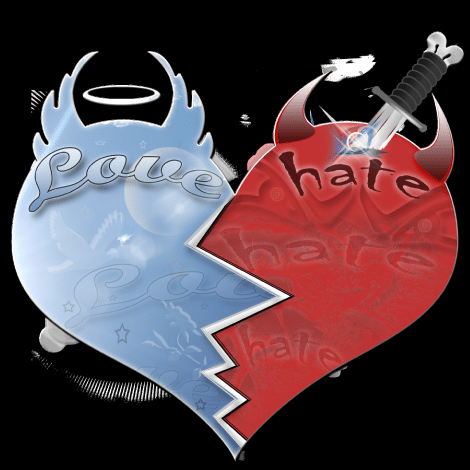“It’s a fine line between love and hate,” goes the old song. But is it true? What is a love-hate relationship? Is it possible that you can feel love for your partner in one moment and hate them the next? Or both at the same time. Does your partner give you all the support in the world on one day and then appear to recoil from you the next? Find out the signs of a love-hate relationship.
The Opposite of Love is Not Hate
Many people make the mistake of thinking that the two emotions are on the opposite end of the love scale. This is not true. The opposite to love is indifference. Love must, by definition include caring; indifference does not. It is possible to hate someone for their behavior, but to care about them deeply at the same time. Ask any mother of a difficult or wayward teenager.
An interesting fact is that when murderers are asked why they killed their wife, many say, “Because I loved her.” That is the case far more often than, “Because I hated her.” Therefore we might assume that being loved intensely by someone is far more dangerous than being hated.

13 Signs You Are in a Love-Hate Relationship
- You often feel that your relationship is a sham. You both present a ‘happy couple’ face to the outside world, but sometimes you feel as though you are living an ugly lie.
- Your relationship is a never-ending competition or even a battle. It makes you exhausted just thinking about it. Two egos slogging it out.
- You are always breaking up and making up. There is a sense of being together/not being together even if you don’t physically split up. It can be lonely inside a love-hate relationship.
- You bring out the best, and worst, in each other. You might be lovely people, individually, but together…? You experience behavior in yourself that you never thought you’d be capable of. You sometimes shock yourself with the intensity of your emotional responses. You wonder where your hateful words came from; at the same time you cannot believe anyone could say such foul things to you in return.
- You can’t fix your conflicts. You think you do but, in truth, you have skimmed over the cracks. Pretty soon, the same issue will surface again. And again.
- You swing wildly from one emotion to another. You are immersed in your lover. You adore them. Next thing you detest every little thing about them. One feeling you never feel is indifference. It’s either very, very good, or very, very bad. Periods of stability and level emotional states are few and far between.
- Thinking about your relationship is a way of life. It’s always there, usually in the forefront of your mind, or at least, never far away.
- Your partner has characteristics that set them apart from others. You adore them. No-one can come close. Your partner has behaviors that set them apart from others. You hate, detest and even fear them.
- Monday: you are so happy you met your partner. Tuesday: you plan what you are going to wear to his or her funeral.
- You realize that your relationship follows a definite cycle. You begin to distrust the happy times because you know that bad ones are on the way.
- You or your partner display narcissistic or sociopath traits.
- Empathy is missing. Your major concern is how you feel, how the other person affects you.
- You can’t see a future in this relationship. That’s because you are going round and round in the same holding pattern.

Can a Love-Hate Relationship Work?
A love-hate relationship can last a long time and usually does. This is because both partners are addicted to the emotional turmoil. When you are apart, everything seems dull and gray because they are not there. The relationship is a complex cocktail of narcotic-like emotion. Yet, like narcotic drugs, a love-hate relationship is always toxic. Neither partner is able to be at their best at work, or socially, because the relationship is like a millstone that has to be carried around.
Counseling may help a love-hate relationship. You will learn how to build and expand the areas of the partnership that work well and manage the issues with coping strategies. It really depends on whether both partners want it to succeed.
When to Get Out of a Love-Hate Relationship
- If there is any form of abuse, emotional or physical, by either or both partners, it’s time to end it.
- If you hate them more than you love them, it’s time to leave.
- If you are deeply unhappy most of the time, it’s time to call it a day.

Children of a Love-Hate Relationship
Should you have children, or step-children, and you want to keep the family together, you really must deal with the problems. Children raised within a love-hate relationship are confused, insecure, unstable, and are likely to develop behavioral and learning problems. Additionally, they are witnessing the cycles of your toxic relationship so never learn how to relate to other people properly. This will, clearly, affect their adult relationships. Is this the kind of role-model you want to be for your kids?
Either seek help to put the relationship on a strong footing or split up. Your children are better off with one parent, than two who are involved in a destructive and never-ending cycle of a love-hate marriage.
Areas to Work on in a Love-Hate Relationship
If your relationship is to work, then certain areas must be addressed.
Commitment. If only one is committed to the relationship, it’s not going to work, so both partners have to be 100 percent certain that they want this.
Trust. If you or your partner experience intense feelings of jealousy, then this must be examined and dealt with. No relationship is able to survive the constant battering of jealousy.
Forgiveness. Learning how to forgive, forget and move on is so important. Should one or both continually refer back to past misdemeanors, it creates a poisonous atmosphere. Letting the past go, is key to making a go of it.
Compassion and empathy. If this is love, then you have to care how the other person is feeling. You have to realize what effect your words and behavior are having. If, in the heat of the moment, you could care less, then perhaps you are not as committed as you thought you were.
Time for yourself. It’s a human necessity to pursue friendships, activities and relaxation away from the other partner. Not only that, when you have a healthy life outside of the relationship, both partners are able to bring freshness to the other. You are not constantly tied together in a stale, toxic bond. All relationships need space in order to change, evolve, grow and adapt. That’s how they last for a lifetime.


0 Responses
very nice